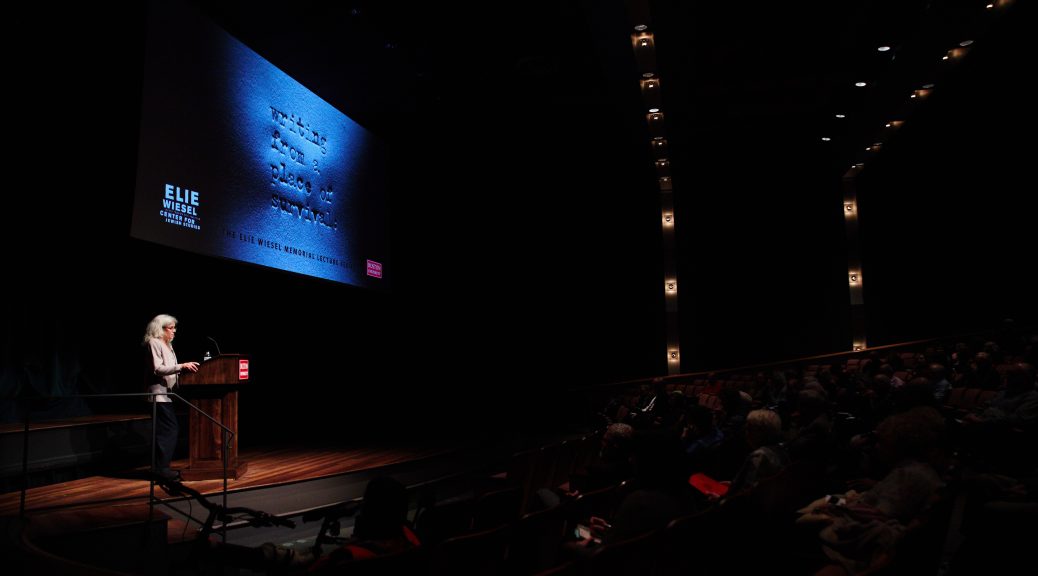By Abigail Gillman
In the brutal nights we used to dream
Dense violent dreams,
Dreamed with soul and body:
To return; to eat; to tell the story.
Until the dawn command
Sounded brief, low
‘Wstawac’
And the heart cracked in the breast.
From: Primo Levi, “Reveille”
These lines, which comprise the first stanza of Primo Levi’s poem “Reveille,” lay at the center of the second Elie Wiesel Memorial Lecture of 2019. The poet recalls the prisoners’ dreams of returning home, eating, and telling the stories, interrupted each dawn by the Polish command. But the three repetitions of the word “dream,” argues Sharon Portnoff, also allude to three dreams in Dante’s Purgatorio: dreams which enable the pilgrim to ascend to paradise. In Dante, the dream represents the power to imagine, to tell the story of hell, in a way that preserves dignity and redeems suffering.
How did Dante help Levi to survive, and to write about the hell of Auschwitz? In Portnoff’s words, “Levi’s poem – as almost all of his writings do – draws on the texts of the Western canon to invite us to literally engage the fact of Auschwitz against the backdrop of our higher aspirations, to spend our time reading and studying his many allusions. We do this not to find out what the human being really is in the midst of his suffering, but to enact what the human being might be.”
Dante’s Hell, and Levi’s hell: as Dante is inscribed throughout Primo Levi’s oeuvre, Levi’s writings, his poetry, his two memoirs, become a commentary or education about Dante. Levi’s turn to Dante recalls the approach of another child survivor, Israeli writer Aharon Appelfeld, who referred to Franz Kafka as his redeemer, and who copied from the Hebrew Bible in his quest to become a writer.
When a great writer translates or interacts with another great literary work, there is a magic or alchemy which is hard to put into words. Portnoff owned this challenge, teaching us various approaches one might take and inviting us in to her own process of interpretation.
In doing so, she continued the narrative begun by Rabbi Joseph Polak in the first lecture back in September. Polak spoke about memory, and unexpectedly, about shame. Though he has authored an award-winning memoir, Polak taught us that he continues to think about how to tell his story, and is still retrieving, or receiving, new memories from the war, which he survived as a very young child. The sound of counting aloud in German, heard on a recent trip to Germany, evoked a visceral reaction, an aural memory of the Appelplatz, the prisoners’ roll call, which, according to his mother, he attended daily as a young boy, sitting on the shoulders of a Nazi soldier.
Rabbi Polak also spoke, provocatively, about shame as the most damaging, lasting injury the Nazis perpetrated on their victims. By implication, those of us who were not there need to ask whether we continue the shaming by not being fully present to survivors.
In these lectures, we learn not only about the survivor, but about the power and limits of language for the survivors of genocide, and for those of us who engage with their writings. The speakers challenge us to hear those stories in new ways; to wake up, as Levi’s poem implores; and to become more human in the process.
Abigail Gillman is Professor of Hebrew and German in the Department of World Languages and Literatures and a core member of the faculty of the Elie Wiesel Center for Jewish Studies where she teaches courses in modern Jewish and Hebrew literature. She served as interim director of the Center in 2016-17 and directed the university-wide Day of Learning and Commemoration for Elie Wiesel in September 2017. Her most recent book is A History of German Jewish Bible Translation (University of Chicago Press, 2018).

